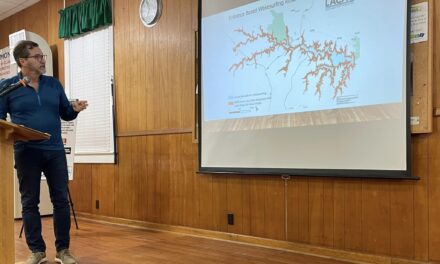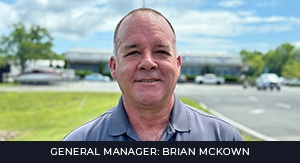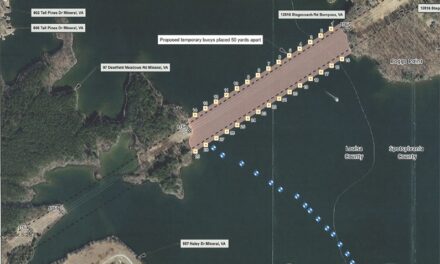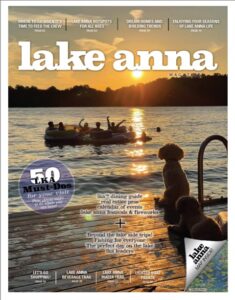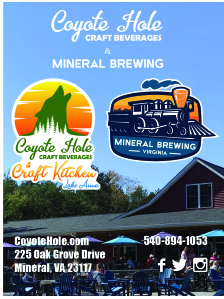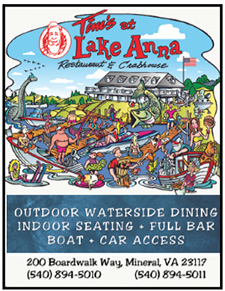By Tammy Purcell/Engage Louisa
The Louisa County Planning Commission met August 17 for a long-term planning work session where members continued a discussion from July about proposed regulations for short-term rentals, a popular lodging option typically offered on online platforms like Vrbo and Airbnb.
STRs have exploded in popularity in Louisa County over the last several years, especially around Lake Anna. They’ve attracted both tourists and investors to the lake, stirring concerns among some year-round residents who argue that the rentals are businesses operating in residential neighborhoods and threaten the character of their community, public safety and the health of the lake. Some residents have complained at county meetings that STRs in their neighborhoods are frequently overcrowded, and they worry about failing septic systems harming the lake’s water quality.
County officials have grappled with how to regulate the temporary lodging option for more than a year. Late last year, officials shelved a proposed ordinance that would’ve established a county-wide short-term rental registry, implemented a controversial occupancy cap, and mandated regular septic system inspections. The proposed ordinance met resistance from some in the business community, who worried the occupancy cap would hurt tourism. County officials also expressed concerns about potential changes in state law regarding how localities can regulate STRs.
A new proposal takes a different approach, laying out broad rules for STRs in residential zoning in the county’s designated growth areas, leaving them unregulated in agricultural zoning and requiring STR operators to obtain a Conditional Use Permit in most other zoning designations.
After a lengthy discussion at a pre-meeting work session in July about a draft ordinance that would regulate short-term rentals, the Planning Commission decided it wanted to talk about the issue some more.
The commission agreed to discuss the proposed regulations again at an August 10 work session, prior to its regular monthly meeting, and didn’t set a date for a public hearing where they’d likely vote on whether to recommend that the Board of Supervisors approve the rules.
Supervisors sent the draft to the commission for review at its June 20 meeting after a previous effort to regulate short-term rentals stalled last year. Currently, the lodging option, typically offered on platforms like Vrbo and Airbnb, isn’t sanctioned by the county. But Assistant County Administrator Chris Coon said there are at least 460 short-term rentals operating here, according to the Commissioner of Revenue’s Office, which is tasked with collecting the county’s two percent transient occupancy tax. Many but not all of the rentals are clustered around Lake Anna.
The proliferation of short-term rentals around the lake has stirred controversy with some residents complaining that STRs are businesses operating in residential neighborhoods.
In response, the county crafted a proposed ordinance last year that included a two-person per bedroom occupancy cap for many homes—in accord with Virginia Department of Health guidelines for homes using septic systems—and mandated periodic septic system inspections, among other rules.
County officials ultimately shelved the proposal, citing concerns that the General Assembly would change how it permits localities to regulate STRs. The new proposal relies on the county’s zoning code instead of a section of state code specific to short-term rentals.
Coon said the draft ordinance seeks to balance community concerns about the rentals with the rights of those operating them by implementing “common sense” rules. He has described the draft as offering “a little bit less specificity but cast(ing) a broader net” than the previous proposal.
But several commissioners expressed concerns about the draft, in part, because it lacked specificity. They wondered if the ordinance would solve any of the complaints that prompted the county to consider regulations, suggested its provisions would be difficult to enforce and contended that STR owners wouldn’t know exactly what they need to do to abide by the rules.
Broadly, the proposed rules impose some regulations on STRs in densely populated areas where they’ve seemingly caused the most concern while largely avoiding regulations in the county’s most rural reaches.
The ordinance defines STRs as “the rental of a dwelling for periods of 30 days or less” and designates it as a commercial use. It permits STRs by-right with some restrictions on property zoned residential (R-1 GAOD, R-2 GAOD) in the county’s designated growth areas, as defined in the 2040 Comprehensive Plan, as well as on property zoned for resort development (RD). Virtually all waterfront real estate on Lake Anna is included in a growth area. STRs operating in these zoning designations would be required to:
– provide a point of contact for their property to Louisa County and its subdivision’s governing body, if applicable;
– provide to tenants a copy of Louisa County code sections pertaining to noise and solid waste as well as the definitions for Special Occasion Facilities and Gatherings as part of short-term rental contracts.
– inform tenants that using the property for a special event typically held at a special occasion facility—a wedding, for example—is prohibited unless the property has a valid Conditional Use Permit;
– provide tenants with at least one off-street parking space per bedroom and an off-street parking space for a trailer (20 ft by 8 ft);
– provide to Louisa County documentation of septic system inspections and repairs whenever they are completed, if applicable;
comply with all applicable state building code and safety regulations;
If STR owners didn’t follow those rules, they would be required to obtain a Conditional Use Permit from the Board of Supervisors.
STRs operating inside or outside of growth areas in industrial (IND, I-1, I-2) and commercial (C-1, C-2) zoning designations would require a CUP as would STRs operating in residential zoning designations outside of growth areas. Short-term rentals in agricultural zoning (A-1, A-2) inside or outside a growth area would be permitted by-right and not subject to the rules governing STRs on residentially zoned property in growth areas.
Coon said that the county wouldn’t impose rules on STRs in agricultural zoning to comply with an opinion that Attorney General Jason Miyares published earlier this year. The opinion essentially says that localities can’t use their zoning code to regulate short-term rentals on agricultural land because the use is considered agritourism.
Commissioners grilled Coon about the proposal, asking questions about everything from parking to occupancy. Chair John Disosway wondered if renters would be permitted to park anywhere on a lot—even on a septic system’s drain field—since the ordinance only stipulates that one parking space per bedroom is provided off-street.
Coon responded that, as currently proposed, people could park anywhere as long as it wasn’t on the street. But he said he would include more specific language for the Planning Commission’s review.
Mountain Road District Commissioner Gordon Brooks said that the proposal could leave STR operators confused about exactly what they had to do to follow the rules. He suggested that STR owners wouldn’t know how many people they can rent to as occupancy is impacted by both VDH regulations and the statewide building code. Brooks said he’d like to see the regulations include occupancy guidelines.
“The biggest thing is the number of occupants. How many people can I rent this to? We shouldn’t make that difficult to find,” Brooks said.
Coon said that he would offer some options for discussion at the next work session to address Brooks’ concern.
Several commissioners wondered if the county had the staff to adequately enforce the rules. Patrick Henry District Commissioner Ellis Quarles suggested that the county’s two code enforcement officers already had a full plate. Coon and Community Development Director Josh Gillespie assured the commission that staff could handle the task.
Louisa District Commissioner Manning Woodward said that he thought regulating STRs should be left to homeowners’ associations and that the county shouldn’t be involved at all, observing that a majority of the problems with STRs are at Lake Anna.
“The homeowners’ associations should make the rules in their bylaws to regulate it as they see fit. As many homeowners’ associations as there are down there, there will probably be a multitude of ways that they deal with these things. Some of them may choose not to deal with it at all. But that’s where we are hearing the problems from,” Woodward said.
Chairman of the Louisa County Board of Supervisors, Duane Adams said, “As proposed STR regulations work through the Planning Commission I’m looking forward to this issue coming before the Board. I’m confident we will arrive at a resolution that protects the property rights of all parties.”
Jackson District Supervisor RT Williams, Jr. told L&T, “I am eagerly awaiting a report back from our STR Committee, one that hopefully preserves landowners’ rights and also provides consideration for neighbors’ rights. That’s the kind of recommendation I can get behind.”
Mountain Road District Supervisor Tommy Barlow, the board’s liaison to the commission, responded that he had read the restrictive covenants for several developments on the lake and they prohibit commercial activity. But he said that county officials had been told that HOAs didn’t have “enough teeth” to enforce those provisions, prompting residents to turn to the county for help.
Barlow suggested that STRs operating inside or outside of growth areas should require a CUP because they’re commercial activity. He said that the county requires CUPs for businesses that are far less impactful.
“These are money-making operations. They make a lot more than I do in a year,” he said, noting that he had to get a CUP to operate his business at its current location. “Some small outfit like myself has to come to the board for a CUP that has no impact on the neighborhood.”

